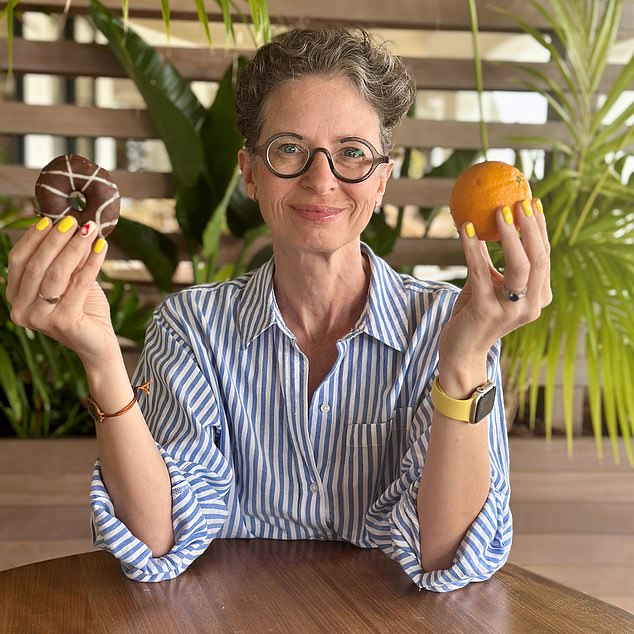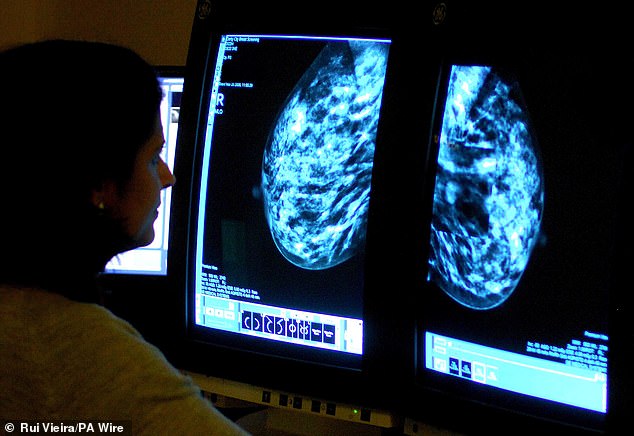Experts have today hit back at ‘dangerous’ claims that stress and mobile phones can cause breast cancer after a wellness influencer controversially said she gave herself the disease.
Stephanie Weeks, from Mississippi in the US, was diagnosed with stage three triple negative breast cancer—one of the deadliest form of the disease—in February 2021 at the age of just 42.
After undertaking gruelling rounds of chemotherapy, radiotherapy and surgery as well as ‘healing methods’ including acupuncture and alkaline water, she was told she was cancer-free later that year.
Now, in an Instagram video watched more than 750,000 times, she has claimed ‘chronic stress’, ‘not taking sleep seriously enough’ and putting her mobile phone in her bra for years ‘contributed’ to her diagnosis.
But experts have labelled the claims ‘absolute nonsense’ and ‘dangerous’ and said there was a ‘lack of evidence’ to prove any of the claims.
Studies have also long suggested there is no consistent evidence linking stress, mobile phones and poor sleep to an increased risk of breast cancer.
In the Instagram video Ms Weeks said her ‘aggressive’ and ‘invasive’ stage three triple negative breast cancer diagnosis was ‘devastating’.
She added: ‘I think there are several things that contributed, stress. The stress was chronic, it was for years and it was tremendous.
‘The second thing was I did not take sleep seriously enough. Sometimes I would work all day, all night and go days without sleeping.
‘I was really screwing up my circadian rhythm big time.
‘Another thing was my cell phone in my bra for years. The tumour was right on the edge of the skin, right where the cell phone sat.
‘So I’m saying these things to empower you and educate you so you can make better choices than I did.’
But experts today said all three factors were ‘absolute nonsense’.
Liz O’Riordan, a retired breast surgeon and author of The Cancer Roadmap: Real science to guide your treatment path, told the Daily Mail: ‘It’s absolute nonsense. And bloody dangerous and very persuasive.
‘Mobile phones and WiFi do not cause breast cancer.
‘Whilst a stressful life and lack of sleep can lead to poor lifestyle choices, gaining weight, alcohol and no exercise stress and lack of sleep by themselves do not cause breast cancer.

Liz O’Riordan, a retired breast surgeon and author of The Cancer Roadmap: Real science to guide your treatment path, said the claims were ‘absolute nonsense and ‘bloody dangerous’
‘This is dangerous. If she did want to empower women she should be quoting the source she got this information from.
‘There are some small studies that suggest they might be a factor but they’ve all been disproved due to lack of evidence.’
Dr Mangesh Thorat, a consultant breast surgeon at Homerton University Hospital, added: ‘Existing evidence does not show any association between breast cancer and stress, sleep deprivation or organ proximity to mobile phone signal.
‘Avoiding or minimising stress and ensuring adequate sleep is however a common-sense advice that helps at least improve quality of life.
‘Everyone should aim to achieve these objectives.’
Indeed, studies have noted that some women wonder whether stress caused their breast cancer. But the evidence for this is poor.
One of the largest study’s to date by British researchers in 2016 did not show any consistent evidence that linked stress to breast cancer.
Another European analysis published in the BMJ, which looked at 12 studies involving more than 100,000 people who were followed up for several years, did not find a link between stress at work and breast or colorectal, lung and prostate cancers.

Currently, all women aged between 50 and 70 are invited for screening every three years, with the first invitation between the age of 50 and 53
It can be harder to maintain a healthy lifestyle, such as not smoking and drinking, during stressful situations. These habits can lead to an increased cancer risk, warns Cancer Research UK.
But the agency insists ‘no evidence’ shows ‘those who are more stressed are more likely to get cancer’.
While sleep deprivation can lead to various health issues, including inflammation and insulin resistance, The Institute of Cancer Research says there is direct link between lack of sleep and an increased risk of breast cancer.
Studies, including a large meta-analysis from the Million Women Study, have found no significant association between sleep duration and breast cancer risk.
Meanwhile, rumours that electromagnetic radiation or waves from mobile phones can cause cancer, have spread for decades.
But researchers say there is no good evidence that this is the case, despite many fearing that keeping their phone close to their body will put them at risk.
Mobiles work by sending and receiving electromagnetic waves to and from phone masts.
While high energy radiation can cause cancer by damaging DNA, the version emitted by phones is so weak that it does not have this effect, says Cancer Research UK.
The charity adds that although 4G and 5G networks rely on higher frequency radio waves to work in comparison to phones made a decade ago, it’s still not enough energy to damage DNA.
But, because the technology is still relatively new, scientists continue to monitor research in this field to track any potential long-term effects.
One in seven women in the UK are diagnosed with breast cancer in their lifetime—around 56,000 a year—making it the most common cancer in the UK.
The figure stands at roughly 300,000 annually in the US.
Around 85 per cent of women diagnosed with breast cancer survive more than five years.
However, triple negative breast cancer—which accounts for around 15 per cent of all breast cancers in the UK and US—is far more challenging.
Typically, it grows and spreads faster than other breast cancer types and has fewer treatment options.
It is also more difficult to treat because it doesn’t interact with hormones such as oestrogen—for which there are targeted therapies.
On average around 77 per cent of women with triple negative breast cancer will survive their cancer for five years or more after they are diagnosed, but depending on the stage this can fall as low as 12 per cent.
This is compared to around 90 per cent of women with other forms of breast cancer who will survive for at least five years.












